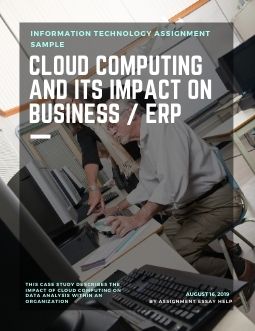
You can download the sample Information Technology essay on Accounting Information System with the following question for free at the end of this page. For further assistance in Information Technology Assignment help, please check our offerings in Information Technology assignment solutions. Our subject-matter experts provide online assignment help to Information Technology students from across the world and deliver plagiarism free solution with free Turnitin report with every solution.
(AssignmentEssayHelp does not recommend anyone to use this sample as their own work.)
Accounting Information Technology Assignment Question
- What's cloud computing?
- Are there any new risks that may arise as a result of cloud computing?
- Will cloud computing be the catalyst for any organisational and / or structural adaptations to change?
- Are there any external changes and pressures an organisation may face as a result of cloud computing?
- Are there any ethical issues and / or social impact from implementing cloud computing?
Accounting Information Technology Assignment Solution
Q1. The impact of cloud computing on data analysis within an organization
The first impact of cloud in data analysis is easing out data collection[A1] . So field agents of a company, for example, who have no access to the office computer to upload their findings, can do so if the data is stored in the cloud.
Somewhat similar to the reason above is the option of accessing that data for on-floor analysis. So any employee can access the data even remotely and from any location. This has been recently started by Time Warner, which uses a cloud-based data analytics system, facilitating their employees to utilize their sales data from anywhere within and outside the office complex.
The third impact is the storing of data. If the volume of data is huge, storing and maintaining them in-house requires additional investment from the company. This is eliminated if cloud computing is used as the cloud service provider himself takes care of that. This is especially pertinent to smaller companies as it provides them a level playing field on par with the larger competitors when it comes to data analytics.
The fourth impact is on the installation of the software used for data analysis. In the case of cloud-based data analytics services such as Amazon Redshift (Amazon Redshift, n.d.), this is taken care of by the service provider itself, essentially cutting down the hassle for the company.
The last impact is through the processing power needed for analysis. The parallel computing capability provided by cloud-based data analytics services is both faster and cost effective.[A2]
Q2. The role that clouds computing can have on an organization’s network
The primary role of cloud computing in an organization's network is virtualization. As the company expands and more and more employees are added, the need for additional supporting network becomes prominent. At this point, cloud computing can facilitate the company by reducing the dependence on a cumbersome physical network.
Associated with virtualization is the role of scalability and cost cutting. Cloud based computing and network come at a fraction of the cost of physical networks. Hence, no matter the size or density of the network needed, it is very easily available, scalable and the cost will always be less as compared to alternatives.
[A3] The third role is a simplification. As only the services are exposed to the end user and the background infrastructure is hidden, the network becomes simpler to use. Thus the company need not invest in increasing the knowledge level of employees to utilize the network and its corresponding services. The cost of maintenance also comes down drastically.
Q3. The role cloud computing has within an Accounting Information System
The first role is cost reduction. With cloud computing, the overall cost of the hardware and the software comes down for the company since they are mostly provided by the cloud service provider itself. It also becomes more economical since only a subscription fee needs to be paid and that also for only the users currently accessing the application.
The next role is to increase the security. Cloud-based AIS providers such as MYOB often have better levels of security and internal controls than similar software used in-house.
Making the business more responsive is the next role. There are two factors associated with this. Firstly, the addition of new software or upgrading the existing ones is pretty easy and is often done more frequently by the cloud service providers than the companies themselves can afford. Secondly, in case additional resources are needed by the business, it can be quickly accessed.
Next, comes the role of easing out administration. All that is needed to access the cloud-based AIS application, is the web browser and all the employees using the application have access to the same software. Thus administration becomes easy. In some cloud AIS service providers, a real-time data backup is provided so that data loss is minimized.
Q4. Any potential risks that should be avoided when implementing a cloud-based ERP solution in an organization
Potential risks to be avoided are:
1. Implementation time is a crucial factor and not making efforts to reduce it will put undue stress on the company. Therefore, before the implementation, a thorough analysis of business needs is required.
2. The ERP system will fail if it is not accepted and used by all employees. Thus involving the employees' knowledge during implementation, is as important as training them to use the ERP system, after implementation.
3. Using a cloud-based ERP system will often put more stress on parts of the existing infrastructure, than an in-house ERP system. Hence, a proper load testing is necessary to prevent any post-integration issues.
4. While implementation, it is also necessary to ensure that the cloud-based system is compatible with the existing products and the legacy systems.
5. Cloud-based ERP providers often provide generic applications which need to be suitably customized for usage by different companies. Thus, during implementation, such customizations need to be addressed.
[A1]A simple straight sentence, but well answers the question.
[A2]The summating section is presented appropriately
[A3]Well analysed
(Some parts of the solution has been blurred due to privacy protection policy)


 WhatsApp Us
WhatsApp Us